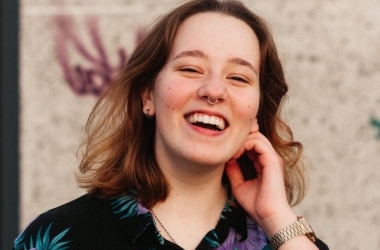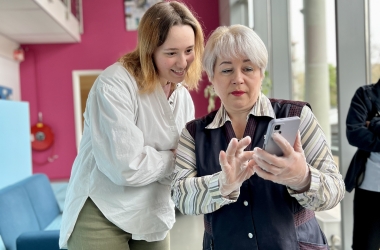Wittenborg Graduate Helps Refugees Integrate in the Netherlands
Wittenborg Graduate Helps Refugees Integrate in the Netherlands
Wittenborg Graduate Helps Refugees Integrate in the Netherlands

Sofiia Norenko, from Ukraine, Growing as a Person and Professionally in the Netherlands
“It was all very weird when the war broke out because I had never experienced something like that. I could not expect or imagine myself being in a situation where I would be afraid of going back home. I was also worried for my family because my parents and my little brother were in Ukraine at the time when everything started. Now, fortunately, they are safe in Spain, but the last time I was in my home country was in December 2021, shortly before the war began,” says Wittenborg graduate Sofiia Norenko.
Despite the harshness of this situation, Sofiia has been able to make a positive impact on the lives of Ukrainian refugees and people of other nationalities who have left their countries for the Netherlands in search of better prospects. Since July 2022, she has been part of Heroyam, a job agency that helps refugees integrate into Dutch society.
“This helped me cope with the initial shock because I was busy with work, and I was also graduating at the time. So, I felt like I was not only developing myself but also helping other people to start new lives in the Netherlands,” the graduate highlights.
Originally from Odesa, a major port city in Ukraine, Sofiia recently completed a bachelor’s degree in Hospitality Business Administration (HBA) at Wittenborg’s Apeldoorn study location. Her journey in the Netherlands started in 2019 when, at 17 years old, having just finished high school, she decided to go abroad for the next phase of her studies.
Sofiia explains that she discovered Wittenborg through a Ukrainian student agency named Study UA, which helps prospective students find higher education institutions abroad. She was attracted to Wittenborg because she found the Netherlands to be a cool place and the school looked very good, with affordable tuition fees in comparison to other institutions.
“Plus, I liked the fact that Wittenborg was an international school and I thought that studying there would be fun, especially when coupled with a specialisation in hospitality management, which is an industry where you work with people from all around the world. I come from a very small neighbourhood in Odesa, where not many foreign people live, so I thought that it would be exciting to meet people from other countries and learn something from them.”
By moving abroad to live on her own, Sofiia had to face challenges such as finding housing. “I had a hard time adapting and it was so stressful because I was so young back then, and it was the first time I was living on my own. Finding a place to live in the Netherlands was difficult because of the housing crisis here; I wasn’t prepared for that. In Ukraine, when you are searching for a place, you have more negotiation power than here,” she comments.
However, she soon found an important source of support by meeting her Dutch girlfriend, who played a fundamental role in helping her adapt to this new life. “My girlfriend and I met only two weeks after I had arrived in the Netherlands. So, that helped me adapt to my new environment and even to situations like the COVID-19 pandemic, which started just a few months later. Actually, I didn’t care that much about the pandemic because we were having such a good time together. There was some financial stress, of course, but eventually I found some part-time jobs and things got a bit easier.”
Overall, Sofiia says that her experience in the Netherlands has made her a stronger and more independent person, adding that Wittenborg contributed significantly to this. “When I joined Wittenborg, I had just graduated from high school, where the teachers help you in absolutely everything you do. However, here, you are responsible for your own actions, and no one is going to push you and tell you what you have to do. Studying is your own responsibility. At first, I found it a bit challenging, but it made me a much stronger person with a greater sense of responsibility.”
She points out that while her degree was very theoretical, it was also lots of fun. “We learned a lot of interesting theory, and the whole experience with the graduation assignment at the end was also very intense. When I talk to friends who graduated from other Dutch schools, it seems that at Wittenborg we have a higher level of education. The content we learn and the assignments we do are very precise from an academic perspective. On top of that, during the two blocks we had before the onset of the pandemic, I was meeting so many new people from different places. I found it very fun and inspiring, and I liked that feeling of community we had at Wittenborg.”
According to Sofiia, what she will miss the most from Wittenborg is being constantly challenged, because she loves having her progress evaluated while learning new things. “You have to do assignments all the time, and they can be really hard sometimes. And you’re thinking ‘I hate this’, but at the same time you go out of your comfort zone, you learn new stuff and that helps you to grow. It’s easier to come out of your comfort zone when you have external motivators like that, as well as the pressure to graduate since you are paying for your studies.”
The graduate mentions that one of her best memories from Wittenborg is the oral defence of her graduation assignment, which took place in early October. She recalls that she had been very stressed about her project, and the last week before her defence was not going well. “I couldn't bring myself to make the PowerPoint presentation, even though I am usually very good at creating presentations, and I was very worried that I was going to fail. But then I pushed myself and did it, and my academic supervisor also motivated me on the day before the presentation, and everything went well; my assignment got quite a few compliments.”
Sofiia adds that the moment of her defence was brightened by the presence of people who are important for her. “The best part was that when I entered the room to defend my graduation assignment, my girlfriend was in the audience, as well as a girl who has been my friend since I started studying at Wittenborg. That was very symbolic to me, because I started and ended my academic journey with the same people, and their support was very important to me.”

Growing as a professional
In addition to her academic and personal progress, Sofiia’s journey in the Netherlands is also one of professional growth and development. Having initially worked for Thuisbezorgd as a food deliverer, she joined Heroyam as a part-time, on-call worker after seeing a job advertisement published by the company on Instagram.
Eventually, she would become an intern at the job agency for refugees, being in charge of recruiting professionals for companies in the hospitality sector. And, after graduating, Sofiia was hired as Heroyam’s recruitment operations team lead. The graduate describes her experience at Heroyam as really positive and enriching.
“The people here are really chill and nice, and being part of the company has taught me so much. I speak to people much more confidently now, because a big part of my job involves talking to others. And I have the chance to do lots of creative thinking because it's a new company, so many ideas of mine regarding operational aspects are used on a daily basis.”
Sofiia points out that one of the main difficulties faced by refugees in the Netherlands is the language barrier, because many of them do not possess a high level of proficiency in Dutch or English. Furthermore, refugees require support and guidance in understanding the labour rules and regulations of the Netherlands.
She emphasises that Heroyam is forming partnerships with companies seeking workers from this specific demographic. “We inform and educate these companies on the cultural differences and how to communicate with newcomers, so that they know what to expect and how to make this collaboration work.”
Although Heroyam is still a new company, Sofiia stresses that it is already well-known in the job agency sector. “We maintain positive and friendly relationships with our clients and the flex workers we help, so the feedback on our services and communication has been great. On top of that, because all the employees in Heroyam are young, we are full of energy and motivation. We are flexible and innovative in our operations, which makes it convenient and exciting for both flex workers and clients.”
During her studies, Sofiia also had the opportunity to do a four-month internship at Holiday Inn, which was her first experience working in a hotel. Besides enabling her to develop technical skills such as using hospitality software, this internship also gave her the chance to learn more about customer service and event organisation, among other competencies.
According to the graduate, hospitality and human resources are close areas because they involve working with people, and her academic and professional experiences have helped her shape her career by combining elements of both fields.
“One of the coolest things about Wittenborg is the fact that its programmes are broad and, in addition to hospitality, we also had subjects on human resources and other topics. That's how I realised that my passion was in HR, and my graduation assignment was about the retention of hospitality employees after the COVID-19 pandemic, a theme that combines both fields. Overall, Wittenborg’s programmes give students a great overview of topics such as business and entrepreneurship.”
When it comes to her plans for the future, Sofiia says that she hopes to stay in the Netherlands. “I love it here and I find everything so beautiful: the people, the culture, the language and the opportunities you have. I would like to go on working with Heroyam and developing my skills in recruitment and Human Resources.”
She advises current students to work hard, not to give up but to find their own pace. “During my first block, when I had just arrived here, I failed all my subjects. I was having a hard time because starting a new life in another country can be overwhelming. But the most important thing is to not give up and keep doing it. I could have graduated in three years, but I realised it would be better for me to take it at a slower pace, so I decided to complete my degree in four years. Finding your own pace is essential,” Sofiia concludes.
WUP 12/12/2023
by Ulisses Sawczuk
©WUAS Press
1805 words